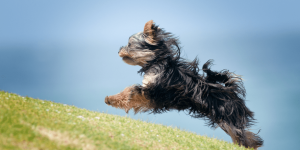Why is My Dog Getting Fat and How Can I Help Him Lose Weight?
In this Holiday4Dogs article, we look at some reasons why a dog may gain weight and some tips on how to help the portly pooch shift those extra pounds – plus, if you need to shed a bit of blubber yourself, exercising a little more with the dog means you will benefit too. If you are wondering why your dog is getting fat and want some tips on reducing your waggy pal’s waistline – read on!
Just like people, there are many reasons why our pet dogs may gain weight. Owners may not realise until their dog’s weight begins to impact on their health and lifestyle. It’s much the same with us, as many of us might relate to – it can be so easy to gain weight, but not so easy to shift it.
Sometimes, weight gain just creeps up on us and many of us. Before we know where we are, we realise we can’t fit into our favourite clothes, or walking up-hill becomes a bit of a struggle, involving lots of puffing and panting.
Obesity in dogs can lead to unpleasant health complications, just as it can in humans. Being overweight puts extra strain on joints, muscle tissue, the heart and other internal organs.
Some breeds are more prone to health issues than others as a result of being too fat, but all over weight animals are more likely to have reduced life expectancy.
Canine health check.
If you notice your dog has gained weight recently it’s important to seek veterinary advice first. Weight gain can be sign of more serious underlying health conditions and so it is really important this is checked out by a qualified vet.
 These include conditions such as diabetes, Cushing’s disease, or thyroid problems.
These include conditions such as diabetes, Cushing’s disease, or thyroid problems.
Certain medications can have an impact on weight and, of course, pregnancy will undoubtedly result in a very rotund female dog.
In general, most animals will gain weight simply from overeating, under exercising, or a combination of the two.
There are other factors, such as age and neutering status which can also have an impact on a dog’s metabolism which may result in weight gain.
It is important to speak to your vet if your dog’s diet or exercise has stayed the same, yet he is gaining weight. Only a vet can advise whether there are other health issues at the root of the weight gain.
Diet.
Assuming your dog has been checked over and deemed fit, it is time to put your dog on a diet. Your vet may advise a special diet, but you can safely reduce your dog’s current food.
Check you are feeding the recommended daily amount. You may want to consider home prepared food (non-human) which is based on a more natural diet. A change of diet is something to consider if the dog has become unhealthily overweight.
However, remember to cut down his daily food amount gradually as a sudden change in quantity, or ingredients, could cause tummy upsets. Be careful with toy dogs as they can suffer from hypoglycaemia.
Healthy snack alternatives.
Treats are often a source of weight gain and many processed dog treats are full of empty calories.
Giving your dog titbits from the table, or sharing a biscuit with him on your coffee break, is sure to contribute to your dog gaining weight.
Human foods should be selected carefully, as many have far too much sugar and salt for dogs.
Even in small quantities, adding unsuitable human food can add a considerable amount of extra weight in a short space of time. Some human food is even toxic to dogs.
Try offering your dog some alternative healthy treats like carrots, apples, blueberries and other dog safe fruits and vegetables.
Exercise.
Exercise is also the best way of keeping your dog trim, but increase exercise gradually. Don’t go from couch to 5k overnight.
Swimming is a great exercise for chubby hounds because it’s a low impact form of exercise, but gives the dog a good workout at the same time. Every dog will have different exercise needs.
However, the average dog will need about 30 minutes, to an hour of exercise per day. This might include, walking, fetching a ball , swimming, running, obedience exercises, or agility.
, swimming, running, obedience exercises, or agility.
Try and provide your dog with a combination of different exercises, a couple of times a day. Exercise is good for physical and mental health.
Conclusion.
Unfortunately, it’s often all too easy to put weight on and the same can happen if we over-feed our pets too.
As with human dieting, always take things slowly when reducing your dog’s weight – crash diets can be just as bad for dogs, as they are for people.
However, if we need to help our dogs lose weight we may also find we benefit health-wise too. Overall win – win!
This article is for information purposes only and cannot replace advice from a qualified animal health expert. If you are concerned in any way about your dog’s weight, it is important to speak to your vet. Once underlying health issues have been ruled out, your vet will support you to develop a healthy diet for your dog – thereby reducing excess weight and promoting health and wellbeing.



